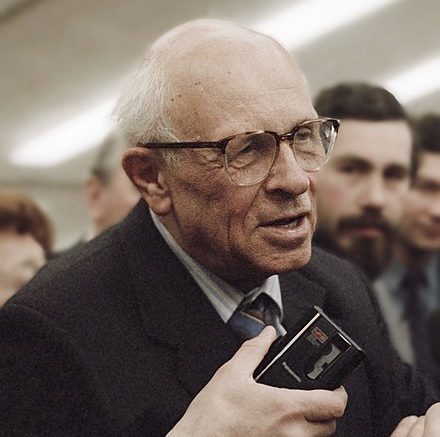A spectre is haunting Vladimir Putin — the spectre of Andrei Sakharov.
Sakharov was a physicist and the father of the Soviet hydrogen bomb. He later became a world-famous campaigner for peace, democracy and human rights. He spent several years in internal exile as the regime did all it could to silence him.
In 1986, Mikhail Gorbachev phoned him up to say that he and his wife could finally return to Moscow. Sakharov swiftly took advantage of the democratic reforms which were then transforming the Soviet Union. When free elections were held for the first time since 1917, Sakharov was elected to the the All-Union Congress of People’s Deputies. Three years after his return to Moscow he died.
The organisations he helped to found, and the ideas he promoted, have declined dramatically in recent years. There is no sense in which the Andrei Sakharov Foundation, the Moscow Helsinki Group or the NGO ‘Memorial’ today represent a serious threat to the Putin regime. And yet that regime has declared war on all those organisations and above all on the legacy of Sakharov himself.
It was not always thus. Just five years ago, Putin congratulated the Moscow Helsinki Group Chair and human rights activist Lyudmila Alexeyeva, during a ceremony to present her with a state award in the Kremlin. Sakharov was one of the founders of the Moscow Helsinki Group.
But last week Russia’s Prosecutor General designated the Andrei Sakharov Foundation as “undesirable” and closed the Moscow Helsinki Group. Memorial was closed even earlier despite being, like Sakharov himself, a recipient of the Nobel Peace Prize.
Back in the 1970s, the Soviet dissidents were a tiny group, largely unknown in the USSR. From time to time, some of them might try to stage a protest in the streets or write a document that would be shared informally. The response of the Stalinist regime was always repression — jail, prison, mental institutions, internal exile, and expulsion from the country. In some cases, dissidents were murdered too.
But they persisted, and the world learned about their work. Though they could not mobilise large numbers of people in the Soviet Union, they represented a moral force. And they were, in the end, a force to be reckoned with.
Putin’s efforts to recreate the Soviet Union do not consist solely of his armies invading Ukraine. He is also attempting to restore the kind of totalitarian society that existed for more than seventy years in his country. And that society tolerated no dissent, not even from the country’s greatest physicist, Andrei Sakharov.
As the Ukraine war enters its second year in February, we can increasingly see just how frightened Putin has become. He’s afraid of the Ukrainians, whose soldiers have fought with incredible bravery and skill against the Russian invaders. He’s afraid of NATO and arms from Western countries that are far superior to what the Russian army can put into the field.
But he’s also afraid of his own people, the Russians who have shown again and again throughout their history that they can only stand so much. When their tsar, Nicholas II, waged a stupid and pointless war against Japan in 1905, Russia experienced its first modern revolution, which forced the regime to make concessions. In Febuary 1917, the Russian people rose up again — and this time they finished off that regime.
But it is not only masses in the streets and mutinies in the army that Putin fears.
He also fears the existence of small groups of brave dissidents, the kind of people like Andrei Sakharov and Lyudmila Alexeyeva. That’s why he has turned on the organisations that preserve their legacy — including Memorial and the Moscow Helsinki Group. He represses them because he fears them. And he fears them because he knows that their ideas are more powerful than his repression.
In the end, Sakharov won. His successors today in Russia, even if they are only small groups of dissidents and anti-war activists, will also win. And that is Putin’s nightmare.
This article appears in this week’s issue of Solidarity.
